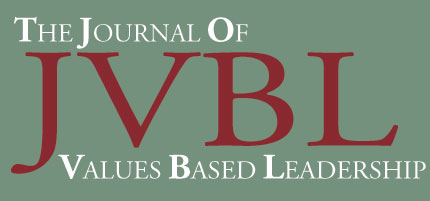- CONTENTS:
- Letter from the EditorArticle SummariesDedication and RemembranceEmploying the Seven Army Values to Win Hearts and MindsCommentary: The Business of Warfare: "Winning Hearts and Minds"Conflict Resolution: Cultural Understanding ImperativeThe Personal Values of School Leaders in Pakistan: A Contextual Model of Regulation and InfluenceThe Needs of the Stakeholders are the Seeds of Growth for the Organisation: Vignettes of Wisdom from Mr. G. NarayanaThe Character X Factor in Selecting Leaders: Beyond ethics, virtues, and valuesA Model for Implementing a Successful Sustainability StrategyEngaged Leadership: New Concept or Evolutionary in Nature?

- LETTER FROM THE EDITOR
People pay for what they do, and still more, for what they have allowed themselves to become. And they pay for it simply: by the lives they lead. ~Edith Wharton
There appears to be a common term used in the business world more uniformly these days – "stakeholders." Many business trends, especially those involving organizations in the international market, have realized that the Friedman, single-goal emphasis of generating wealth for a company‘s shareholders, has expanded to include the concomitant instruction while serving the greater needs of those affected by the operations of the business entity in a fair and equitable manner. This new movement may just be a ploy to lure in would-be investors, or, due to socioeconomic and environmental factors and the increasing awareness of the world‘s collective needs and demands, be a genuine commitment to serve the greater good.
Making money does not necessarily imply eschewing generating wealth nor signal the complete abandonment of Friedman economics. Rather, whether through new enlightenment of leaders, infusion of spirituality, fear of litigation, the desire to seek a more prominent role in international transactions, or a hybrid of all, the customer, supplier, local community, distributor, government entity, media, and society as a whole are demanding recognition as active players in the operation of a business. And that business can no longer simply turn a blind eye and a deaf ear to avoid the needs of the larger stakeholder pool. The world is now so interconnected that abuses in a remote, developing country are universally publicized and invoke public outcry. Outsourcing businesses can no longer hide their exploitation of labor populations in faraway places. Economic boycotts ensue and even companies demand change. Steve Jobs of Apple was forced by public pressure to demand an end to the abuses committed by Foxconn, a Chinese electronics factory, which systematically underpaid and overworked its young workforce to the point of multiple suicides. As Foxconn is the exclusive manufacturer and supplier of the electronic components incorporated in Apple‘s iPads and Smartphones, such negative publicity had to be quelled through the development and institution of a comprehensive plan to ameliorate such untenable working conditions. While Foxconn has a long road of reform ahead, necessary changes have been instituted.
While much of this may be lip service and temporary in nature, it is undeniably occurring. Thus, whatever the source or motivation, businesses are becoming more cognizant of the effects their business operations are having on their stakeholders.
Several of the articles included in this issue explore this notion. Case studies and interviews conducted in Pakistan and India demonstrate the importance of community values and spirituality in accounting for the needs of stakeholders while continuing to foster company growth. Others emphasize the importance of accounting for cultural sensitivities and mutual respect in the global marketplace, jettisoning the former myopic rallying cry of it’s me against them.
No – it is us. All of us.

─ Elizabeth Gingerich, Editor

